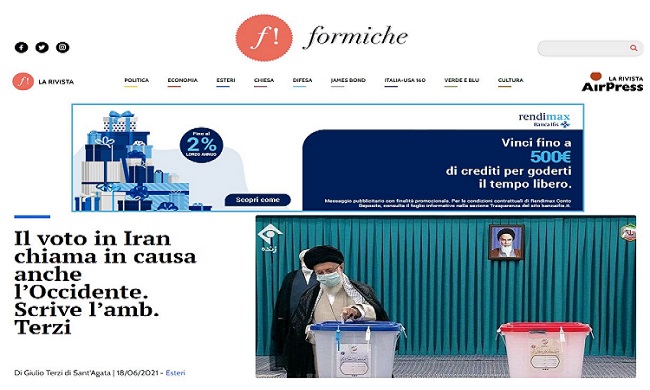By Giulio Terzi di Sant’Agata | 18/06/2021 – Formiche
The significance of these elections and Raisi’s certain victory should not be underestimated by Western leaders seeking to renegotiate the JCPOA. Comment by Ambassador Giulio Terzi di Sant’Agata, former Foreign Minister
In these hours, the Iranian regime of the ayatollahs is holding – for the thirteenth time since 1979 – the habitual “farce” of presidential elections. Generally, up to now, it has been an occasion for the Iranian people to express their mood, but the current ones reach the maximum level of the grotesque and at the same time of the dramatic.
It should always be kept in mind that the Islamic “Republic” of Iran is first and foremost a theocracy and the ruling mullahs have always had absolute control over the country’s limited democratic processes. Notably, this year the number of candidates eligible to run for president is the narrowest it has ever been in the 42 years of the regime. In fact, on May 24, the Council of Guardians excluded all so-called reformist, or centrist, candidates, leaving the field to just seven “hard-line” candidates or candidates with no chance of winning.
A “selection” clearly orchestrated with the sole objective of ensuring the victory of the chosen one of Ayatollah Ali Khamenei for the presidency, the current head of the Iranian Judiciary, Ebrahim Raisi. We are talking about a personality accused of countless crimes against humanity and human rights committed in more than thirty years of roles held at the top of the Iranian regime. Since November 2019 Raisi is blacklisted by the U.S. Treasury, precisely because of the serious and repeated violations of human rights.
In addition to his positions on the nuclear issue, on Israel and on Iranian objectives in the Middle East, it is certainly necessary to underline the key role he played, and of which he has repeatedly and publicly boasted, in the massacre of over 30,000 political prisoners in the summer of 1988.
A horrifying crime for which justice has yet to be served. The United Nations continues to press the regime for answers. As many as seven UN Special Rapporteurs – on summary, arbitrary or extrajudicial executions; on the rights to freedom of peaceful assembly and association; on the situation of human rights in the Islamic Republic of Iran; on the protection and promotion of human rights and fundamental freedoms while countering terrorism; on torture and other cruel, inhuman and degrading treatment or punishment; the Working Group on Enforced or Involuntary Disappearances – have formally requested an international investigation into the 1988 massacre, without ever obtaining any response from the Iranian regime.
The fast track Raisi obtained to gain the presidency is a clear sign of the Supreme Guide’s desire to have a new president elected who is willing to carry out the most heinous and bloody repressions to eliminate any form of opposition or dissidence. Iran’s theocracy is increasingly unstable. Since 2018, there have been three waves of widespread, protests across the country, with hundreds of demonstrations nationwide. The economy has collapsed. More than 75% of the population is below the poverty line. People routinely rummage through trash for leftover food.
The large majority of Iranians have for a long time, despite the violence of repression, shown total intolerance towards the regime in power. It is no longer willing to accept the rampant corruption, the total incompetence and misinformation in the fight against the pandemic, the huge waste of wealth in senseless military adventures and terrorist activities, the huge funding to the proxies of the regime in Syria, Iraq, Yemen, Lebanon, Gaza, the isolation that all this has led to, turning Iran into an international pariah. The feuds among the ruling elite, with the mullahs also fighting among themselves in order to remain clinging to power, expose the fractures within the system, while an opposition movement is getting stronger and better organized and rooted in the country.
There have been constant daily calls for the broadest boycott of electoral staging. Authoritative sources predict that there will be the lowest level of participation in the history of the regime.
The significance of these nth “rigged elections” in Iran, and Raisi’s certain victory, are issues that should not be underestimated by Western leaders seeking to renegotiate the JCPOA. The 2015 nuclear deal has certainly not prevented – even marginally – any possible internal dissidence from being bloodily stifled, nor from curbing Tehran’s military aggression throughout the region, nor from limiting its regional and global destabilization strategies, as well as from continuing to be the world’s leading sponsor of terrorism. Neither has it curbed Tehran’s aspirations to have nuclear weapons and a missile program (in blatant violation of UN Security Council Resolution 2331) and a nuclear program (in spite of IAEA bans), raising uranium enrichment to 60%: very close to the realization of a nuclear weapon.
European governments must not forget the extreme suffering inflicted on the Iranian people when they agree to meet with representatives of a regime that hangs and tortures political opponents, pregnant women, minors and even children, that denies any freedom of expression, religion, or sexual orientation and preference, to name only a few.
